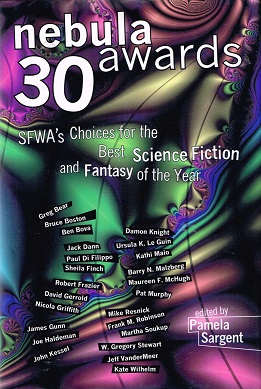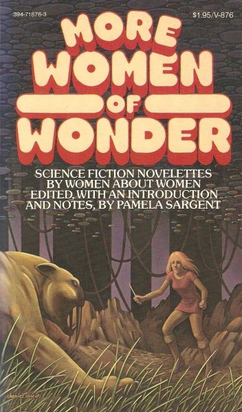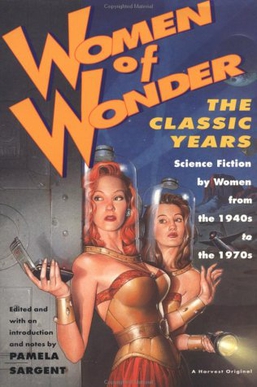Feminist science fiction is a subgenre of science fiction focused on such feminist themes as: gender inequality, sexuality, race, economics, reproduction, and environment. Feminist SF is political because of its tendency to critique the dominant culture. Some of the most notable feminist science fiction works have illustrated these themes using utopias to explore a society in which gender differences or gender power imbalances do not exist, or dystopias to explore worlds in which gender inequalities are intensified, thus asserting a need for feminist work to continue.
Science fiction and fantasy serve as important vehicles for feminist thought, particularly as bridges between theory and practice. No other genres so actively invite representations of the ultimate goals of feminism: worlds free of sexism, worlds in which women's contributions are recognized and valued, worlds that explore the diversity of women's desire and sexuality, and worlds that move beyond gender.

Joanna Russ was an American writer, academic and feminist. She is the author of a number of works of science fiction, fantasy and feminist literary criticism such as How to Suppress Women's Writing, as well as a contemporary novel, On Strike Against God, and one children's book, Kittatinny. She is best known for The Female Man, a novel combining utopian fiction and satire, and the story "When It Changed".
Quark/ was an American anthology book series devoted to avant-garde science fiction and related material, edited by writer and critic Samuel R. Delany and poet and editor Marilyn Hacker; four volumes were published in 1970 and 1971.
Orbit was a series of anthologies of new science fiction edited by Damon Knight, often featuring work by such writers as Gene Wolfe, Joanna Russ, R. A. Lafferty, and Kate Wilhelm. The anthologies tended toward the avant-garde edge of science fiction, but by no means exclusively; occasionally the volumes featured nonfiction critical writing or humorous anecdotes by Knight. Inspired by Frederik Pohl's Star Science Fiction series, and in its turn an influence on other original speculative fiction anthologies, it ran for over a decade and twenty-one volumes, not including a 1975 "Best of" collection selected from the first ten volumes.
Sonya Dorman, born Sonya Gloria Hess, was the working name of Sonya Dorman Hess. She was born in New York City in 1924 and died in Taos, New Mexico on February 14, 2005, at the age of 80.
Pamela Sargent is an American feminist, science fiction author, and editor. She has an MA in classical philosophy and has won a Nebula Award.
"Sex and/or Mr. Morrison" is a short story by Carol Emshwiller from Harlan Ellison's science fiction anthology Dangerous Visions. It has been republished in Emshwiller's 1974 collection Joy In Our Cause, in Pamela Sargent's 1975 anthology Women of Wonder, in Emshwiller's 1990 collection The Start of the End of It All, in Lisa Tuttle's 1998 anthology Crossing the Border, in Michael Bishop's 2009 anthology Passing for Human, and in the 2011 Collected Stories of Carol Emshwiller, Vol. 1; it has also been translated into French and Dutch.

Janus was a feminist science fiction fanzine edited by Janice Bogstad and Jeanne Gomoll in Madison, Wisconsin, and closely associated with that city's science fiction convention, WisCon. It was repeatedly nominated for the Hugo Award for Best Fanzine ; this led to accusations that if Janus had not been feminist, it wouldn't have been nominated. Eighteen issues were published under this name from 1975 to 1980; it was succeeded by Aurora SF.
Virginia Kidd was an American literary agent, writer and editor, who worked in particular in science fiction and related fields. She represented science fiction American authors such as Ursula K. Le Guin, R.A. Lafferty, Anne McCaffrey, Judith Merril, and Gene Wolfe. Wolfe modeled Ann Schindler, a character in his 1990 novel Castleview, in large part on Kidd.
"When It Changed" is a science fiction short story by American writer Joanna Russ. It was first published in the anthology Again, Dangerous Visions.
The role of women in speculative fiction has changed a great deal since the early to mid-20th century. There are several aspects to women's roles, including their participation as authors of speculative fiction and their role in science fiction fandom. Regarding authorship, in 1948, 10–15% of science fiction writers were female. Women's role in speculative fiction has grown since then, and in 1999, women comprised 36% of the Science Fiction and Fantasy Writers of America's professional members. Frankenstein (1818) by Mary Shelley has been called the first science fiction novel, although women wrote utopian novels even before that, with Margaret Cavendish publishing the first in the seventeenth century. Early published fantasy was written by and for any gender. However, speculative fiction, with science fiction in particular, has traditionally been viewed as a male-oriented genre.
Jeanne Gomoll is an American artist, writer, editor, and science fiction fan, who was recognized as one of the guests of honor at the 72nd World Science Fiction Convention, having been a guest of honor at numerous previous science fiction conventions. She has been nominated multiple times for awards in artist and fanzine categories, and for service to the genre of science fiction, particularly feminist science fiction.

To Write Like a Woman: Essays in Feminism and Science Fiction is a collection of essays by Joanna Russ, published in 1995. Many of the essays previously appeared as letters, in anthologies, or in journals such as Science Fiction Studies, Extrapolation, and Chrysalis. Topics range from the work of specific authors to major trends in feminism and science fiction. Through all of these different topics, Russ underlines the importance of celebrating the work of female authors and turning a critical eye on the commentaries and work produced by men.

Nebula Awards 30 is an anthology of science fiction short works edited by Pamela Sargent, the second of three successive volumes under her editorship. It was first published in hardcover and trade paperback by Harcourt Brace in April 1996.
Lisa Yaszek is an American academic in the field of science fiction literature, particularly the history and cultural implications of the genre and underrepresented groups in science fiction, including women and people of color. She is a Regents professor in the School of Literature, Media, and Communication at the Georgia Institute of Technology.

Aurora: Beyond Equality is an anthology of feminist science fiction edited by Vonda N. McIntyre and Susan Janice Anderson and published in 1976.

More Women of Wonder: Science Fiction Novelettes by Women About Women is an anthology of five novelettes and two short stories edited by Pamela Sargent. It was published in 1976. The collection reprints work by female science fiction authors originally published from 1935 to 1974, arranged in chronological order.

The New Women of Wonder: Recent Science Fiction Stories by Women About Women is an anthology of short stories, novelettes, novellas, and a poem edited by Pamela Sargent. The collection reprinted work by contemporary female science fiction authors, originally published from 1967 to 1977. It was published in 1978.

Women of Wonder, The Classic Years: Science Fiction by Women from the 1940s to the 1970s is an anthology of short stories, novelettes, and novellas edited by Pamela Sargent. It was published in 1995, along a companion volume, Women of Wonder, The Contemporary Years: Science Fiction by Women from the 1970s to the Present.

Women of Wonder, the Contemporary Years: Science Fiction by Women from the 1970s to the 1990s is an anthology of short stories, novelettes, and novellas edited by Pamela Sargent. It was published in 1995, along a companion volume, Women of Wonder,The Classic Years: Science Fiction by Women from the 1940s to the 1970s.









